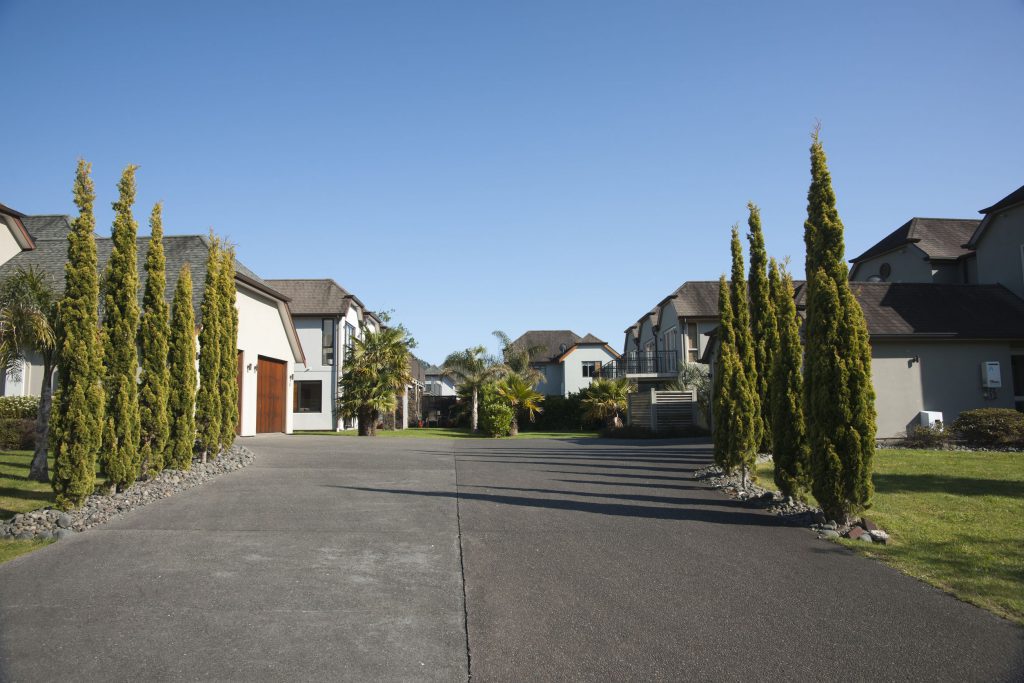Sharing a Driveway
Know your rights and obligations with shared driveways
Many episodes of Neighbours at War told of disputes regarding shared driveways. Whether you currently own a property or you’re in the market to buy a property with a shared driveway, it pays to know your rights and obligations to ensure you and your neighbour won’t be featuring on the next episode.
Right of way easement
The most common shared driveway is formed by an easement, granting ‘A’ the right of way over ‘B’ (or part of ‘B’). The rights and obligations of each party will be found in the easement certificate or instrument registered on the titles to the respective properties. It’s likely those easement instruments will refer to the Land Transfer Regulations 2002 and Schedule 5 of the Property Law Act 2007, which set out the implied rights and covenants that apply in right of way easements.
Both the Regulations and the Act allow the grantee and the grantor (and their agents, invitees, tenants and so on) the right to pass and re-pass over the easement area on foot, or with vehicles, machinery, plant and stock. The parties must repair any damage that they cause and they must keep it clear of obstructions such as parked vehicles or wheelie bins. If your neighbour parks on the right of way but you can still get past, then they may not be in breach of the implied rights.
The Regulations state that the cost of general repairs and maintenance of the right of way is to be shared equally between the parties who use the right of way. The Act states, however, that each party must make a ‘reasonable contribution’ to the cost. This would generally mean that the owner of the rear property would contribute more than the owner of the front property, as they would use a larger portion of the driveway. Your easement instrument should indicate whether the Regulations or the Act apply.
Access lot
These days it’s common for subdivisions to contain ‘access lots’ that allow you to reach your property. These are recorded on your title, showing that you own a share of the access lot along with your neighbours who also use it.
For example, if five properties use the access lot, each property is likely to own a 1/5th share. The Act generally also applies to access lots. Again, your title will give details as to your rights and obligations in respect of the access lot. It is, however, likely that the maintenance and repair costs would be borne by the properties based on their share of the access lot.
Body corporate
If you own a property within a body corporate then your body corporate’s rules will govern the use of your driveway (or ‘common area’ as it may be known). Body corporates usually have tighter rules regarding the use of the common area. The rules can restrict the noise level of vehicles, hours of use and prohibit parking in the common area. This can be an issue if you only have one allocated park in the body corporate, but use more than one vehicle.
Your body corporate is responsible for the maintenance and upkeep of the common area; this is paid for with your body corporate levies.
If you have a dispute regarding the use of the common area, it’s likely that the body corporate rules will specify a dispute resolution process.
Cross lease
If you own a property with a cross lease title your driveway is also generally called a ‘common area’ and is owned by all properties in the cross lease. The lease document registered on your title will explain how the common area can be used. Usually, however, the common area is designated solely to allow access to your flat and it’s likely that you may not park in the common area. Maintenance costs are likely to be shared equally between the parties to the cross lease.
If you have an issue with your neighbour over the shared driveway, we suggest you contact us to ensure you’re 100% clear on your rights and obligations that specifically relate to your property before you talk with your neighbour.
Remember that at the end of the day you’ll have to continue living beside each other, so losing your temper and getting your neighbour’s car towed away from the driveway will not be the best course of action!
This article is taken from issue 24 of PropertySpeaking, the quarterly e-newsletter of the NZ Law group of law firms of which HomeLegal is a member. To talk further about dealing with multi offers, or for any of your conveyancing needs, please do not hesitate to call HomeLegal or contact us online.



